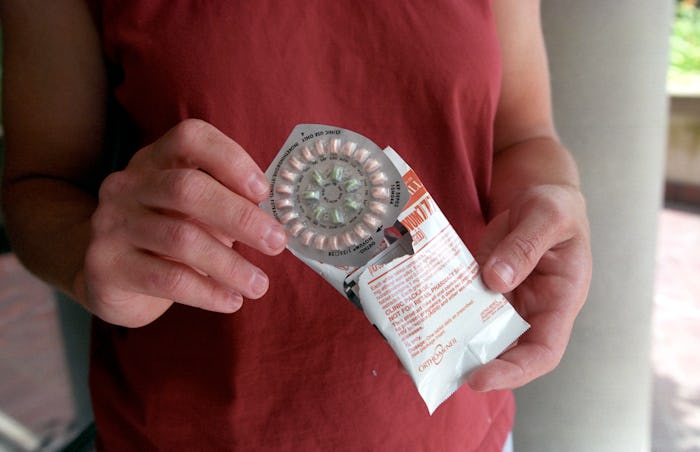Life

How To Get Birth Control From An App, Because Visiting A Doctor Takes Time & Money
Before I go any further, let me make it clear that nothing replaces a physical exam by a doctor, and all women should be visiting an OB-GYN annually. That being said, going to the doctor takes time and money that some women simply can't spare, and contraceptive needs don't always line up with annual exam schedules. So what's a girl to do if she wants some birth control pills, but can't get to the doctor? There's an app for that. Yes, you can get birth control from an app, according to Self, and it's perfectly legal.
While many health professionals believe that birth control should be available over the counter (and California and Oregon allow pharmacists to prescribe birth control), the vast majority of women still need to take time off of work (which costs money) and see a doctor (which also costs money) in order to receive a prescription for oral contraceptives, patches, rings, or morning after pills. While long-acting contraceptives such as implants or IUDs are increasingly regarded as the gold standard by experts (and they're often cheaper in the long run, as they can last from three to 12 years), the up-front costs associated with such methods just aren't feasible for many women, and that's where smartphones come in.
The New York Times has reported that a handful of apps and web services are now offering prescriptions for birth control. Some take insurance, while others charge a flat rate, some under $20. After answering a few health questions, patients communicate with a doctor via video chat or messaging, and depending on the service, will either receive their prescription in the mail, or at a local pharmacy. The services must follow state telemedicine laws, which vary, but women in most states are able to utilize one or more of the services.
There are also age restrictions for many of the apps; some, such as Virtuwell and Lemonaid, restrict birth control pill prescriptions to patients under 35, due to an increased risk of heart risks in older women. Others, like Prjkt Ruby, have minimum age restrictions due to local consent laws, or concerns over "parents who would get upset," as Lemonaid’s chief medical officer, Dr. Jason Hwang, told the Times.
Still, it's an invaluable tool for those women who do fit into the clinical and political guidelines necessary to utilize the service. Jill Balderson, Planned Parenthood's vice president of online health strategy, told the Times that most of their app's users conduct video calls with doctors in their cars during their lunch breaks. In addition to those women who don't have the time or money for an extra visit with a doctor, it's also useful for young patients who might be embarrassed to ask for birth control in person, or for those living in conservative areas where the only doctors available might let their religious or political views color their treatment of patients. One user told the Times that she utilized Lemonaid after moving to rural Pennsylvania, where "find[ing] a doctor that I even agree with about using birth control was a little bit tough."
Regardless of the circumstances that necessitate the apps' use, allowing women easier access to reproductive medicine is a real game changer. Nurx is available in California and New York. Lemonaid is available in California, Florida, Michigan, New York, Ohio, Pennsylvania, and Washington. Planned Parenthood Care is available in Alaska, Hawaii, Idaho, Minnesota, and Washington. Virtuwell is available in Arizona, California, Colorado, Connecticut, Iowa, Michigan, Minnesota, New York, North Dakota, Pennsylvania, Virginia, and Wisconsin. Prjkt Ruby is available in almost every state, except for Arkansas, Iowa, Louisiana, Missouri, North Carolina, Oklahoma, Oregon, and Texas. Women living in those states are advised to move (by me).